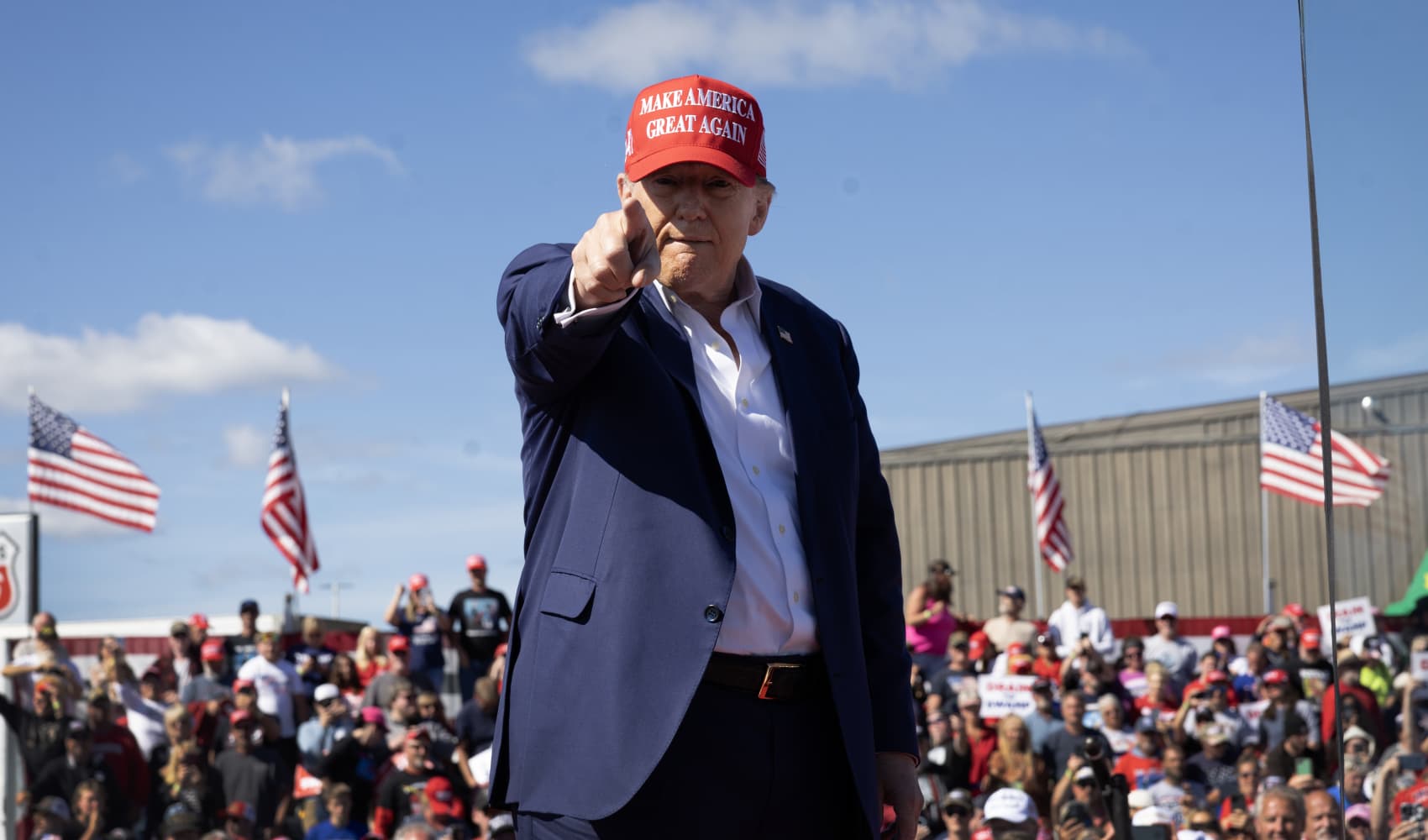
Donald Trump has more than just the presidency on the line Nov. 5 — the outcome of his various legal troubles hinges on the election, as well.
A win in the election he’s dubbed “the most important“ in the history of the country would likely result in the federal criminal cases against him being dismissed, with state criminal cases possibly being frozen until he leaves office and additional delays in the various pending civil cases against him.
A loss to Vice President Kamala Harris, however, could see Trump facing a potential jail sentence later in the month for his criminal conviction in New York and the possibility of additional criminal trials in 2025. It could also leave him open to additional civil trials in the near future, while he’s already appealing $500 million in civil judgments against him.
“There are a lot more arrows in the quiver when you’re the president,” said NBC News legal analyst Chuck Rosenberg.
Get top local stories in Connecticut delivered to you every morning. >Sign up for NBC Connecticut's News Headlines newsletter.
Trump campaign spokesman Steven Cheung predicted Trump would prevail at the ballot box and said all of the cases should be tossed. The “witch hunts against President Trump have imploded” and “should all be dismissed in light of the Supreme Court’s historic decision on immunity and other vital jurisprudence,” Cheung said in a statement.
Here’s a look at where the legal cases against the Republican presidential nominee currently stand, and how they may — or may not — be affected by a Trump win or loss.
Hush money case
Win or lose, Trump’s biggest immediate challenge after the election is his potential sentencing on 34 felony counts of falsifying business records in New York. He is tentatively scheduled to be sentenced Nov. 26 — three weeks after Election Day.
New York Supreme Court Justice Juan Merchan twice postponed the proceeding to give Trump and his attorneys more time to argue that the Supreme Court’s July ruling on the scope of presidential immunity should result in the conviction being thrown out. They also want the charges against Trump either dropped or for him to get a new trial that omits evidence they argue shouldn’t have been allowed in light of the high court’s ruling.
Merchan is supposed to decide on that request by Nov. 12. Trump’s attorneys are expected to immediately appeal if he rules against their client.
If the sentencing proceeds, Merchan could potentially sentence Trump to prison, which would also be immediately appealed. Rosenberg told NBC News in May, after Trump’s conviction, that jail time was unlikely but possible considering the former president spent much of the trial insulting the judge and defying his gag order.
An election victory would give Trump additional fodder for an appeal to stave off jail time; his attorneys have argued in another case that the Constitution bars the president from being restricted from carrying out his official duties.
Federal election interference case
If Trump loses, special counsel Jack Smith’s election interference case is also on the horizon.
The case, which charges Trump with conspiracy to defraud the United States for illegally trying to overturn the 2020 election results, was initially slated to go to trial earlier this year but was paused for several months while the Supreme Court weighed Trump’s arguments that he was mostly protected from allegations of wrongdoing because of presidential immunity.
Prosecutors are expected to continue moving forward with the case even if Trump is elected in November, but it’s likely that whoever Trump names to head the Justice Department will fire Smith and scuttle the case.
In an interview last week with radio host Hugh Hewitt, Trump suggested he might not wait for his new AG. “I would fire him within two seconds,” Trump said, referring to Smith.
Even with Smith out of the picture, the Justice Department would still have to move to have the judge dismiss the case — a request judges don’t always necessarily grant.
Georgia election interference case
The sprawling case charging Trump and more than a dozen others with illegally conspiring to overturn the 2020 election results is on hold until December when an appeals court will weigh whether Fulton County District Attorney Fani Willis and her office should be allowed to remain on the case.
If she is, that could allow the long-stalled case to proceed. Trump’s loss could pave the way for Fulton County Superior Court Judge Scott McAfee to set a trial date for the case. However, if Trump loses, he is still likely to appeal the case further, which Willis brought against him in 2023, which could pose more delays.
If Willis and her office are booted from the case, that would cause additional delays as well. The process of finding another prosecutor can be lengthy; it took almost two years to name one in another case involving Willis.
If Trump wins the election, those delays could be even longer. At a court hearing in December of last year, McAfee asked Trump attorney Steve Sadow when his client could stand trial if he’s elected.
“The answer to that is I believe that under the supremacy clause and his duties as president of the United States, this trial would not take place at all until after he left his term in office,” Sadow replied.
Barbara McQuade, an NBC News legal analyst and a former federal prosecutor, said she believes it’s possible both state criminal cases could be stayed during Trump’s time in office and “would resume upon the expiration of his term.”
Classified documents case
In July, U.S. District Judge Aileen Cannon dismissed the criminal case charging Trump with lying and scheming to mislead federal investigators to retain sensitive classified materials after he left the White House, finding Smith’s appointment as special counsel was illegal.
Smith is appealing the decision, arguing that there’s plentiful precedent for his appointment and that the case should be allowed to proceed.
As with the federal election case, Smith’s office is expected to proceed with business as usual in the appeal even if Trump is elected, although the special counsel’s office would likely be quickly shut down and the appeal dropped.
E. Jean Carroll appeals
Cases that likely won’t be affected by a Trump win or loss are his pending appeals of civil judgments against him totaling more than $500 million.
The former president is appealing the largest award — more than $478 million and growing by more than $111,000 a day — in a civil fraud case in New York state court. During arguments before the state Appellate Division, three members of the five-judge panel indicated they thought the award was too large.
A lawyer for the state attorney general’s office argued that the award is appropriate because the amount of fraud Trump and his company were found responsible for was sizable and went on for an extended period of time.
It’s unclear when the panel will rule.
Trump is also appealing a pair of jury awards totaling about $88 million that he has to pay writer E. Jean Carroll.
Carroll filed two suits against Trump, one for allegedly sexually assaulting her in the 1990s and defamation and another for defaming her while he was president.
The appeals court is expected to rule in the sexual assault case first, and that ruling could come at any time.
Jan. 6 suits
Trump is facing eight pending civil suits related to his role in the Jan. 6, 2021, attack on the U.S. Capitol, including by injured police officers. Similar to the criminal cases, Trump has argued that his actions were protected by presidential immunity.
A federal appeals court allowed the cases to proceed last year after the plaintiffs contended that Trump’s actions weren’t official presidential acts because he was acting as a candidate for the office.
Trump, they noted, would have the opportunity to push back on that stance as the case proceeds.
No trial date has been set in the cases, and with the likelihood of appeals the immunity issues could take months or longer to be determined.
The process could become even more drawn out if Trump wins, because he could attempt to get the Justice Department involved in his defense. He could also try to delay trials in those cases by arguing that they should come after his criminal trial in Georgia, since they cover similar ground and could impact his right against self-incrimination.
“Civil cases are often stayed for that reason,” McQuade said.
‘Exonerated 5’ suit
Trump is facing another defamation suit brought against him this month by members of the so-called Central Park Five, who now call themselves the Exonerated Five.
During last month’s presidential debate, Trump incorrectly said that the men, who are Black and Latino, pleaded guilty in a criminal case in which they’d been charged with assaulting and raping a white woman jogging in New York’s Central Park in 1989. He also said they “killed a person ultimately” although the woman is still alive.
The five, who were teenagers when they were convicted, said they were coerced into confessions by police, and pleaded not guilty to the charges. They were convicted at trial and served lengthy prison sentences while maintaining their innocence.
They were exonerated in 2002 after a review by prosecutors that included DNA evidence that found the jogger had been attacked by a serial rapist who confessed to the crime after the statute of limitations had expired.
That suit is not expected to be affected by Trump’s election given a Supreme Court ruling during the Clinton years that presidents aren’t immune from civil suits that aren’t related to their time in office.
McQuade said she believes the case “could proceed, just as the Paula Jones case did against Bill Clinton.”
This story first appeared on NBCNews.com. More from NBC News:



